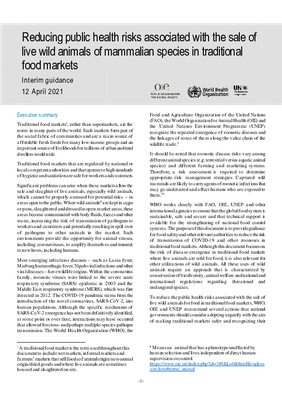Reducing Public Health Risks Associated with the Sale of Live Wild Animals of Mammalian Species in Traditional Food Markets
Traditional food markets, rather than supermarkets, are the norm in many parts of the world. Such markets form part of the social fabric of communities and are the main source of affordable fresh foods for many low-income groups and an important source of livelihood for millions of urban and rural dwellers worldwide. Traditional food markets that are regulated by national or local competent authorities and that operate to high standards of hygiene and sanitation are safe for workers and customers.
https://biodiversitylinks.org/learning-evidence/one-health-evidence/one-health-evidence-inbox/who_reducing-public-health-risks-associated-with-the-sale-of-live-wild-animals_mammals_traditional-food-markets.pdf/view
https://biodiversitylinks.org/learning-evidence/one-health-evidence/one-health-evidence-inbox/who_reducing-public-health-risks-associated-with-the-sale-of-live-wild-animals_mammals_traditional-food-markets.pdf/@@download/image/image.png
File
Reducing Public Health Risks Associated with the Sale of Live Wild Animals of Mammalian Species in Traditional Food Markets
Author(s):
World Health Organization (WHO)
Publication Date: 2021
DOWNLOAD FILE
Traditional food markets, rather than supermarkets, are the norm in many parts of the world. Such markets form part of the social fabric of communities and are the main source of affordable fresh foods for many low-income groups and an important source of livelihood for millions of urban and rural dwellers worldwide. Traditional food markets that are regulated by national or local competent authorities and that operate to high standards of hygiene and sanitation are safe for workers and customers.



